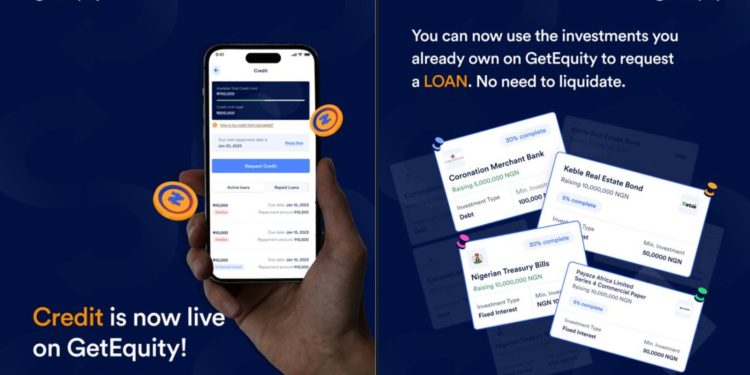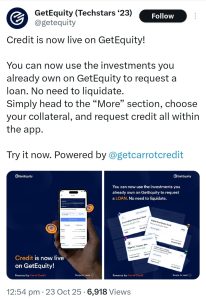Imagine you have built a portfolio of treasury bills, debt notes, or real estate bonds. Then, suddenly, life happens: a business opportunity, an emergency, or an unexpected need for cash. Traditionally, your only option would be to sell, losing your position and potential future returns.
But now, for the first time in Africa, you can stay invested and still access cash.
That is the promise of GetEquity’s new Credit feature, launched in partnership with Carrot Credit. The innovation allows investors to use their existing holdings on GetEquity as collateral for loans without liquidating them.
In one bold move, the company has redefined liquidity for the modern African investor, delivering what banks and stockbrokers have long promised but rarely delivered.
Liquidity Without Exit
Liquidity has always been the quiet problem behind investing in long-term assets. In most African markets, investors who need cash have only one choice: sell their assets and lose potential future growth.
GetEquity has broken that cycle. Through its partnership with Carrot Credit, the platform now allows users to borrow against their portfolio, keeping their investments intact while accessing funds for immediate needs.
Whether you hold Keble Real Estate Bonds, Coronation Merchant Bank Notes, or Payaza Commercial Papers, your holdings can now work twice, building your wealth while backing your credit.
It transforms passive assets into active financial tools.
How It Works
The system is simple yet sophisticated.
- Collateral Recognition
Verified investments on GetEquity are evaluated for loan eligibility and assigned a credit limit. - Instant Credit Request
Within the app, investors can check credit limits, repayment schedules, and apply instantly for funds. - No Liquidation
Your investments remain intact, continuing to yield returns while serving as collateral. - Powered by Carrot Credit
Carrot Credit provides the lending backbone, including credit scoring, risk management, and loan servicing.
This seamless design merges investing, lending, and digital credit into one financial experience.
Global Context: A Familiar Idea, Finally Accessible
While new to Africa, this model mirrors established systems in advanced markets.
1. Securities-Based Lending
In the United States and Europe, institutions such as J.P. Morgan, UBS, and Charles Schwab allow wealthy clients to borrow against their investment portfolios. Known as Securities-Based Lending, it lets investors access liquidity without selling shares or triggering capital gains tax.
GetEquity democratizes that concept.
Instead of million-dollar portfolios, investors with as little as ₦50,000 can now access liquidity from their holdings.
This is not just fintech convenience. It is financial inclusion through innovation.
2. Fintech and Crypto Collateral
Globally, fintechs such as Revolut, Robinhood, and Coinbase have built similar borrowing models that allow users to pledge portfolios or crypto assets for quick credit.
But unlike those volatile, high-risk systems, GetEquity’s model is anchored in regulated, fixed-income assets. That balance of innovation and stability gives it a structural advantage in Africa’s emerging markets.
The Bigger Shift: What This Means for Africa’s Financial Future
GetEquity’s Credit innovation signals a wider shift in the continent’s wealth-tech landscape. It reflects a generation of Africans ready to control both liquidity and long-term wealth.
- Financial Inclusion Reimagined
Access to liquidity is no longer reserved for those with land titles or large incomes. Digital portfolios can now serve as collateral, expanding access to credit for millions. - Investor Retention and Confidence
Investors can meet short-term needs without liquidating holdings. That encourages longer-term participation, portfolio growth, and platform trust. - Alternative Asset Growth
By giving liquidity to fixed-income and private-market assets, GetEquity increases their attractiveness and strengthens the entire alternative investment ecosystem.
Reality Check: The Old Way vs The New
In Nigeria today, only a few investors can access credit using investment holdings as collateral.
- The Central Securities Clearing System (CSCS) allows liens on equities, but the process is bureaucratic and designed for institutional clients.
- Some banks, such as Stanbic IBTC, accept listed shares as collateral, but only for large accounts with extensive documentation.
- The Central Bank of Nigeria has also placed strict limits on share-backed loans because of volatility risk.
So while the mechanism exists, it remains inaccessible to most.
GetEquity’s real innovation lies in simplifying it, making credit accessible, transparent, and instant.
Risks and Responsibility
The model’s success will depend on robust risk management.
- Collateral valuations must be transparent.
- Loan-to-value limits should remain conservative.
- Investors must understand repayment obligations and associated risks.
If these principles are followed, this could become the benchmark for modern, responsible credit in Africa.
Once, you had to sell your future to fund your present. Now, you can fund your present without losing your future.
With GetEquity’s Credit feature, your investments stay alive, building wealth while empowering your liquidity. It is simple, smart, and overdue.
This is not just a fintech upgrade.
It is financial evolution.
It is freedom.

















